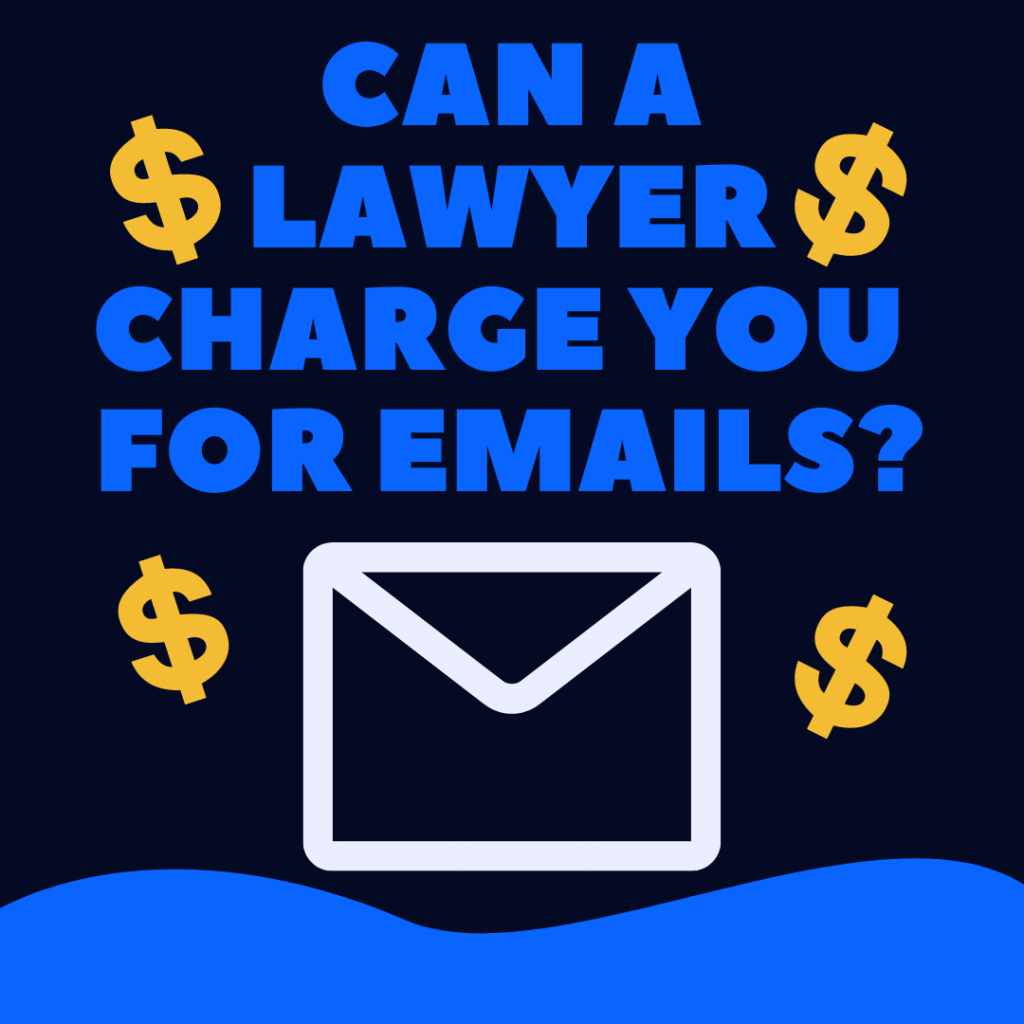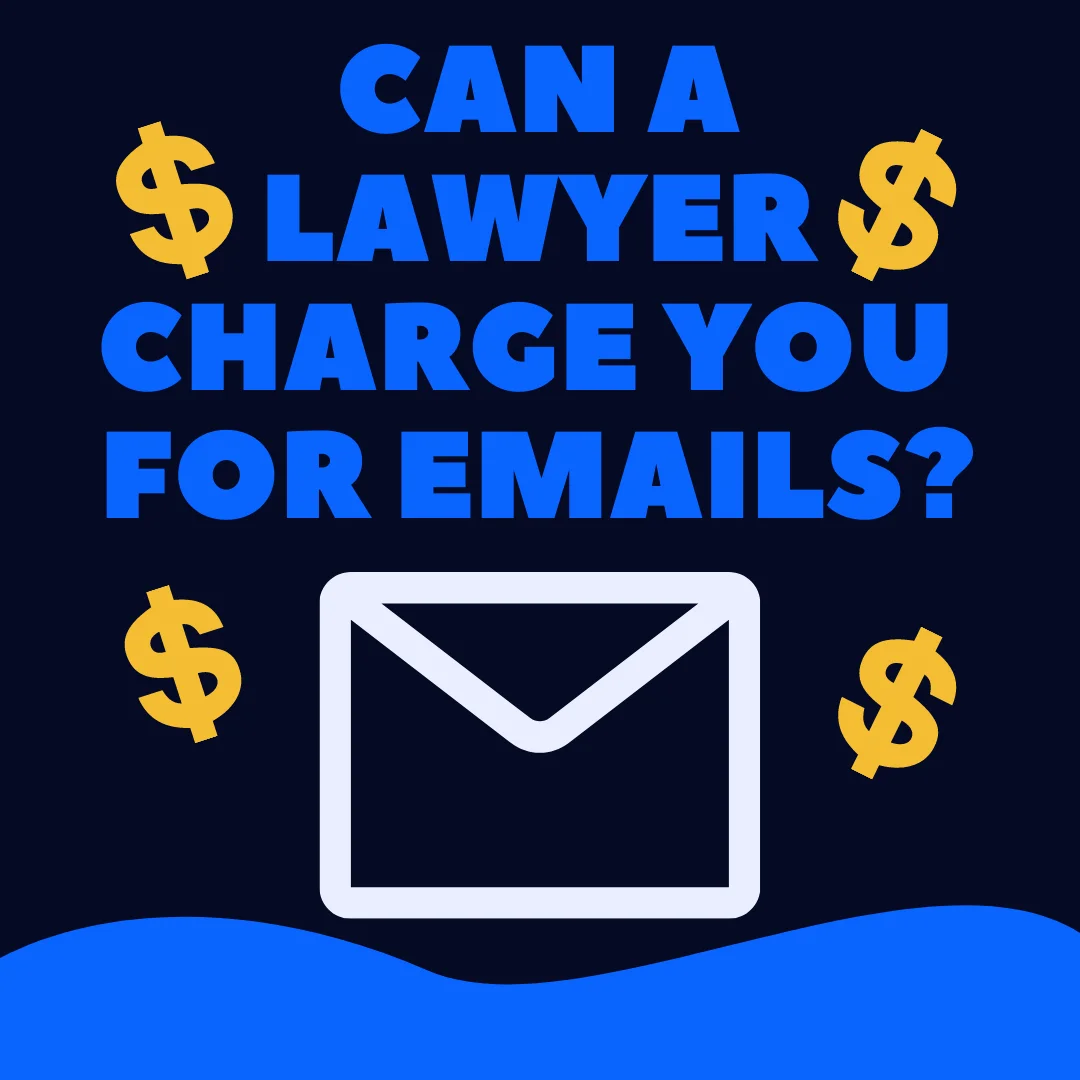Yes, lawyers can charge you for emails. But not always.
We’ll explain.
When Can A Lawyer Charge You For Emails? (EXPLAINED)
Disclaimer
The contents of this web page are for informational purposes only, and nothing you read is intended to be legal advice. Please review our disclaimer about law/legal-related information on this website before taking action based upon anything you read or see.
When The Attorney Fee Agreement Says So
A lawyer can charge you for his or her services (and the services of the firm staff) when an agreement to form an attorney-client relationship has been reached.
In most cases (and it is best practice), the agreement about fees is reduced to a written contract.
And that written contract generally includes the ability to charge for emails.
This written attorney fee agreement is usually reviewed by both parties and signed by both parties before the attorney or his staff charges the client for any services.
But the agreement between the parties does not always have to be written (though this varies state to state) (not recommended).
In general, the attorney fee agreement will state specifically that the attorney can charge you for any work performed on your behalf.
The language will look something like:
It is understood that Attorney will bill client for work that includes but is not limited to: court appearances, telephone conversations, case related travel, office conferences, reading and writing correspondence, preparing and reviewing court documents, and analyzing records and reports.
Emails would fall under “work” as well as “written correspondence.”
The fee agreement might also say something like:
Client will be billed for actual time spent on the case.
Emails would fall under “actual time spent on the case” in this agreement.
The agreement might also state something like:
Billed time includes (but is not limited to) conferences, telephone calls, emails, pretrial discovery, drafting, filing, correspondence, pleadings, deposition fees, faxes, negotiations, research, travel, time in court, meetings, and court appearances.
This fee agreement states expressly that emails are included.
In each of these instances, the fee agreement is construed to include “emails.”
When There’s No Agreement
Written Attorney Fee Agreement are generally 100% the best way to establish what is to be paid for or not.
But state bar organizations rarely make these a requirement.
An attorney client relationship can be formed without a written agreement.
The client will pay the attorney for the services contracted for.
If the parties do not specify, in general it is assumed/implied that all services the attorney performs on behalf of the client or for the benefit of his/her case can be charged to the client.
Are There Times When An Attorney Cannot Charge You For Emails?
Sure! There are a few situations.
First, the attorney cannot charge you for emails if you and she agree that he/she won’t.
Next, the attorney can only charge you “reasonable fees” for her representation of you.
If the amount of time billed for the email is not reasonable, the attorney cannot charge you for that email.
For example, let’s say the attorney charges you a full 1.0 (one hour) for a two line email, it is hard to see how this is a reasonable charge.
Unless the attorney can justify the hour spent on a two line email, the attorney cannot charge the client for it.
Next, attorneys cannot charge you for emails when it violates their ethical duties and responsibilities.
For example, it is unethical to charge multiple clients the full amount when the work was done once and benefits them all.
Explanation: Let’s say an attorney is working two cases that have similar facts.
The cases can both benefit from the same research.
Lawyer performs five hours of research.
Lawyer cannot bill both clients the full five hours, even though the full five hours benefits the clients separately and equally.
It’s not ethical in most jurisdictions, and the attorney would be required to split up the 5 hours billed.
As it relates to emails, if there was a situation where charging for an email in the case violates lawyer ethics, he can’t charge you for it.
Another situation where you shouldn’t be charged for email is when the fee arrangement is a flat fee or contingent fee.
In a flat fee situation, the client tenders a lump sum at the beginning of the case, intended to cover some or all of the case.
In these situations, the flat fee is meant to cover all of the time, and the client shouldn’t be charged for services like email.
In a contingent fee, the client is not paying for the attorney’s time on an hourly basis.
As such, the client should not be receiving bills for emails sent and received, because there are no attorneys fees being collected from the client until recovery.
And the recovery is a set percentage, regardless of how many emails are sent or received.
How Much Should An Attorney Charge For An Email?
In general, attorney should charge their clients reasonable fees for the services rendered.
In most cases, this is the actual amount of time spent on the email.
However, most fee agreements (and accepted practice) allow attorneys to bill a minimum amount for any activity, whether or not it took a few seconds or a few minutes.
A .1 is six minutes.
If reading an email took less than six minutes, pursuant to most fee agreements, the attorney is still allowed to bill a .1, because that is the minimum established by the fee agreement.
However, many attorneys just use a timer, and bill that actual amount of time spent, regardless of whether or not the .1 minimum has been established in the contract.
Wrap Up
Does it make it a better justice system when all the judges are former prosecutors? That’s another question entirely.
Want to learn more about your criminal justice system?
Browse our free legal library guides for more information.
You might also like:
- What Happens When a Lawyer Loses a Case?
- What Are The Differences Between Prosecutors and Attorneys?
- Is Bankruptcy a Criminal Offense?
- Can You Change Your Will Without An Attorney?
- Is It Illegal To Change Lanes In An Intersection In Alabama?
- What Happens When a Plaintiff No-Shows?
- Can a Prosecutor Become a Judge?
- Do All Felony Cases Go To Trial?
- Can You Legally Disown a Child?


